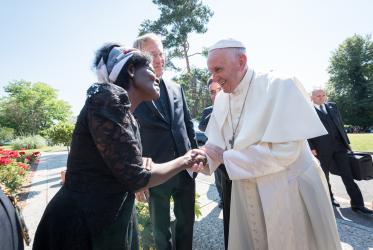The “pilgrimage is both a way to continue working for the one ecumenical movement and a way to move forward in our times that offer new dimensions, opportunities and practices,” said the World Council of Churches (WCC) general secretary Rev. Dr Olav Fykse Tveit, reflecting on the theme “pilgrimage of justice and peace” – a vision promoted by the WCC 10th Assembly in 2013, and the programmes of the WCC.
“We have to move as the world moves into new landscapes of time and events, we need to move in ways that exemplify mission from the margins. We need to move into new relations with other churches and partners, together with the new generation,” said Tveit.
He was speaking to members of the WCC Executive Committee, meeting in Paralimni, Cyprus, from 20 – 26 November. The meeting is hosted by the Church of Cyprus.
The 25-person Executive Committee is a WCC governing body, with member churches in every region, moderated by Dr Agnes Abuom. The committee meets twice a year to monitor the ongoing work of the Council, supervising budget and dealing with policy matters.
“We are particularly called to find new expressions of unity in solidarity with suffering Christians in many parts of the world,” Tveit said in his presentation. “We are called to unity in order to serve the world together in its God-given longing for justice and peace. The world with all its overwhelming crises these days needs people of faith, who are willing to let their faith be much more than positions of the past or identities that separate us,” Tveit added.
The choice of Cyprus as a venue for the WCC meeting was called significant by the WCC general secretary. “This nation is suffering from the consequences of the financial crisis and growing tensions concerning natural resources in the Mediterranean Sea. Cyprus is clearly a station for our pilgrimage of justice and peace,” Tveit said.
While reflecting on plans and priorities for the WCC programmes, Tveit particularly mentioned the peace initiatives in Syria and Iraq, Ukraine, North and South Korea, Israel and Palestine, Nigeria, South Sudan and the Democratic Republic of Congo.
He also mentioned the war in Gaza, referring to how the WCC has condemned incidents of violence. He said, “the frustration upon the lack of a peace process and the failing solutions to the root causes of this conflict” must be taken into consideration. He added that the “continued illegal occupation and extensions of settlements must be stopped.”
He said the WCC will continue to monitor such “developments closely and to accompany churches and people in their search for a just peace” in Palestine and Israel.
Among other WCC initiatives, Tveit mentioned the Interfaith Summit on Climate Change held in New York in September. The summit, Tveit said, managed to convey concerns of faith communities to the United Nations secretary general Ban Ki-moon.
Tveit also spoke about the importance of strengthening of relations within ecumenical partners. A consultation promoting relations between churches and specialized ministries, sponsored by the WCC in Malawi was mentioned by him. Specialized ministries are partner organizations of the WCC working in the area of development, emergency relief, human rights, climate justice and advocacy.
Tveit also highlighted the WCC's work in contributing to the response on HIV and AIDS, and expansion of such a response to a global level. He added that WCC is helping to formulate a timely response on the Ebola crisis along with its member churches and partners.
Tveit said that for the first time, the WCC is collaborating with the UNICEF to work together in promoting children’s rights, as one of the faith partners of the UN agency.
Continuation of the WCC's work in “search for unity with the Roman Catholic Church” and reception of The Church: Towards a Common Vision, a convergence text of the WCC's Commission on Faith and Order, was highlighted by Tveit. He also shared about upcoming initiatives related to the WCC's interfaith dialogue and cooperation programme, which he said seeks to accomplish the vision of pilgrimage of justice and peace, along with other WCC programmes.
WCC Pilgrimage of Justice and Peace











